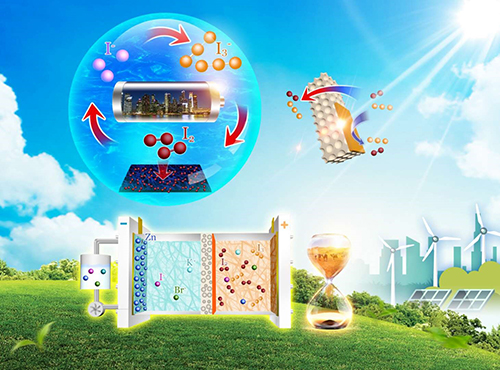Recently, a research group led by Prof. LI Xianfeng and Prof. ZHANG Huamin from the Dalian Institute of Chemical Physics (DICP) of the Chinese Academy of Sciences innovatively put forward the concept of zinc-iodine single-flow battery, which achieves nearly 100% utilization of electrolyte in zinc-iodine single-flow, thus improving the energy density of the battery. The results were published online in Energy Environ. Sci..

The principles of Zinc-Iodine single flow battery. (Image by XIE Congxin)
Large-scale energy storage technology is the key technology to realize the large-scale utilization of renewable energy. Flow battery is one of the most promising technologies because of its high security, long cycle life and high efficiency. Zinc-iodine flow battery has attracted more and more attentions in recent years because of its high energy density and environmental friendliness.
In the previous studies, the research team improved the cycle life and power density by optimizing the electrolyte composition and membrane materials of zinc-iodine flow battery. However, the relatively low utilization of electrolyte caused by internal blockage of zinc-iodine flow battery also remains to be solved.
In this work, the team proposed the concept of zinc-iodine single-flow battery. Unlike traditional zinc-iodine flow battery, this new battery only has a flow circulation system on the negative side, and the positive electrolyte solution is sealed in the positive compartment.
Due to the zinc-iodine single-flow has no flow circulation system on the positive side, there is no blocking problem in the electrolyte pipeline and pump. Therefore, iodine ion can be charged to solid iodine, which increases the utilization rate of electrolyte from about 50% to nearly 100%, and the energy density of the batteries from the previous maximum 80 Wh/L to 205 Wh/L.
In addition, the high power density (0.1W/cm2) of zinc-iodine single-flow batteries was guaranteed by using porous carbon felt as the electrode. The experimental results showed that the zinc-iodine single-flow battery could run steadily for more than 500 cycles at the current density of 80 mA/cm2, and its performance has not been significantly attenuated.
The above work provides an important reference for the development of a new system of high energy density liquid flow batteries. It was supported by CAS-DOE, Dalian Science and Technology Innovation Project and DICP deployment fund. (Text by XIE Congxin)